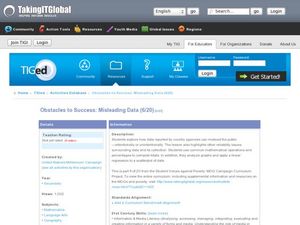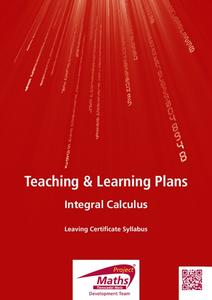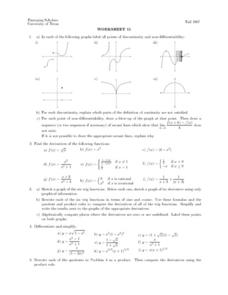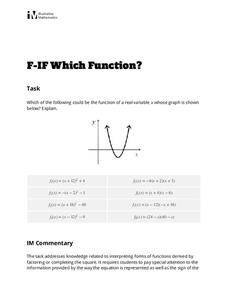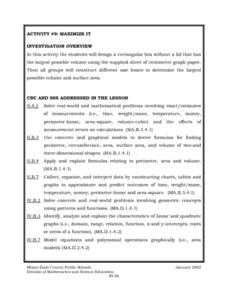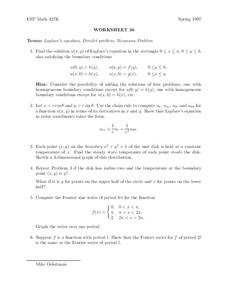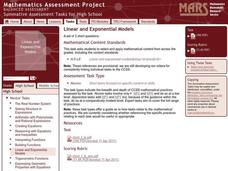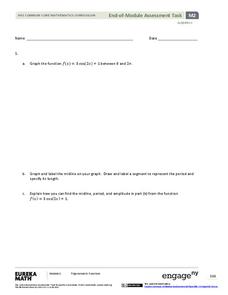Curated OER
Obstacles to Success: Misleading Data
Eleventh graders explore how data reported by country agencies can mislead the public intentionally or unintentionally. In this Cross Curricular activity, 11th graders analyze charts and graphs in order to draw conclusions. Students...
Curated OER
Finding Extrema Graphically and Symbolically
For this extrema worksheet, students use graphing calculators and the optimization method to identify the maximum and minimums of a given function. They compute the first and second derivative, and graph the functions. This eight-page...
Project Maths
Integral Calculus
From derivatives to antiderivatives and back again. Building on the second lesson of the three-part series covering functions, learners explore the concept of an antiderivative. They connect the concept to the graph of the function and...
Curated OER
Worksheet 11 - Points of Discontinuity
In this points of discontinuity worksheet, students observe graphs and label them as points of discontinuity and non-differentiability. They identify the derivatives of functions. This one-page worksheet contains five multi-step problems.
Curated OER
Differentiation of Trigonometry Functions
For this trigonometry worksheet, students differentiate the different trigonometric identities. They derive the sine, cosine, tangent and inverses of these trig identities. There are 18 questions with an answer key.
Curated OER
Worksheet 11 - Intervals
In this interval worksheet, students write a geometric series for the derivatives of a function. Students determine the values of x and where it may converge. This two-page worksheet contains five multi-step problems.
Curated OER
Implicit Differentiation Problems
In this calculus worksheet, students perform implicit differentiation to take the derivative. They solve function explicitly of x. They differentiate between implicitly and explicitly. There are 16 problems with an answer key.
Illustrative Mathematics
Which Function?
Learners are given a graph of a parabola on a coordinate system, but intercepts and vertex are not labeled. The task is to analyze eight given quadratic functions and determine which ones might possibly be represented by the graph. The...
Curated OER
Maximize It!
Students design a rectangular box without a lid that has the largest possible volume using the supplied sheet of centimeter graph paper. They work in groups to construct different size boxes to determine the largest possible volume and...
Curated OER
Worksheet 36
In this math worksheet students find the solution u(x,y) of Laplace's equation in a given rectangle with specified boundaries. Students use the chain rule to compute values for a function and relate this answer to Laplace's equation....
Curated OER
Worksheet 13-Fall 1995
In this math worksheet, students find the domain and range of trigonometric functions. They estimate the limit of a given function. Students identify three statements about one to one functions as true or false. They solve for k in two...
Curated OER
Linear and Exponential Models
Linear or exponential, see if your class can tell the difference. This very basic worksheet looks at different representations including tables of values, graphing, and an equation to assess understanding. This would make a good warm-up...
Curated OER
Ohm's Law
If your future physicists know how to construct simple circuits, include resistors, and use a multi-meter to measure voltage, then you might employ this lesson on Ohm's law. Each lab group investigates the relationships among...
Curated OER
Fire Wars
Your class can practice collecting and analyzing data. They extrapolate information and derive data from fire season statistics. They also choose the most appropriate format to display collected data.
Curated OER
Worksheet 15-Fall 1995
In this math worksheet students use the intermediate value theorem to solve two problems. They find parallel lines that will cut a convex shape into two pieces with equal areas. Students repeat this problem with a concave shape. Students...
Curated OER
Worksheet 15
In this math worksheet, students sketch and label on a number line the regions that converge and diverge with the sequences. Then they examine a smooth function and define its series.
Curated OER
Maximum and Minimum Points
In this maximum and minimum points worksheet, students solve and complete 12 various types of problems. First, they find the area of the smallest triangle given the point of intersection. Then, students find the volume of a box that has...
Curated OER
Integrating Functions
In this math activity, students find the answers to the functions that includes integration and trigonometry. They use the examples for help with the special functions.
EngageNY
Algebra II Module 2: End-of-Module Assessment
Will this be on the test? Learners demonstrate their understanding of trigonometric functions with an end-of-module assessment. They investigate two different real-world situations, one function in pure mathematics, and one...
EngageNY
End-of-Module Assessment Task: Grade 8 Module 4
Connect proportional linear equations and systems. The seven-question assessment is the last installment in a 33-part series. The items cover comparing proportional relationships, slope concepts, and simultaneous linear...
EngageNY
End-of-Module Assessment Task: Grade 8 Module 5
Give your class a chance to show how much they've learned in the module with an end-of-module assessment task that covers all topics from the module including linear and non-linear functions and volumes of cones, cylinders, and...
EngageNY
The Slope of a Non-Vertical Line
This lesson introduces the idea of slope and defines it as a numerical measurement of the steepness of a line. Pupils then use the definition to compare lines, find positive and negative slopes, and notice their definition holds for...
EngageNY
Mid-Module Assessment Task: Grade 8 Module 6
Make sure pupils have the skills to move on to the second half of the module with a mid-module assessment task. The formative assessment instrument checks student learning before moving on to the rest of the lessons in the unit.
EngageNY
Increasing and Decreasing Functions 2
Explore linear and nonlinear models to help your class build their function skills. In a continuation of the previous lesson, learners continue to analyze and sketch functions that model real-world situations. They progress from linear...
